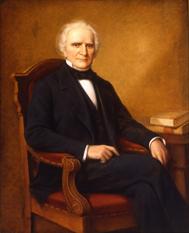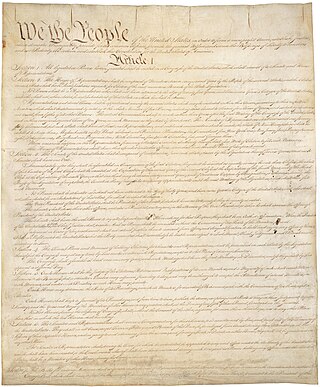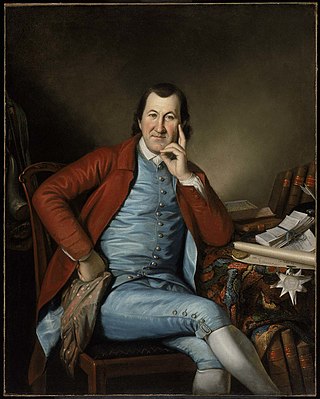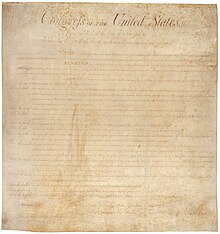
The Declaration of Independence, formally titled The unanimous Declaration of the thirteen united States of America in the engrossed version and original printing, is the founding document of the United States. On July 4, 1776, it was adopted unanimously by the 56 delegates to the Second Continental Congress, who convened at Pennsylvania State House, later renamed Independence Hall, in the colonial era capital of Philadelphia. These delegates became known as the nation's Founding Fathers. The Declaration explains why the Thirteen Colonies regarded themselves as independent sovereign states no longer subject to British colonial rule, and has become one of the most circulated, reprinted, and influential documents in history.

The Founding Fathers of the United States, often simply referred to as the Founding Fathers or the Founders, were a group of late-18th-century American revolutionary leaders who united the Thirteen Colonies, oversaw the War of Independence from Great Britain, established the United States of America, and crafted a framework of government for the new nation.

Samuel Delucenna Ingham was an American politician who served as a U.S. Representative and the U.S. Treasury Secretary under President Andrew Jackson.

William Wirt was an American author and statesman who is credited with turning the position of United States Attorney General into one of influence. He was the longest-serving attorney general in U.S. history. He was also the Anti-Masonic nominee for president in the 1832 election.
John James Beckley was an American political campaign manager and the first Librarian of the United States Congress, from 1802 to 1807. He is credited with being the first political campaign manager in the United States and for setting the standards for the First Party System.

Jacob Shallus or Shalus was the engrosser or penman of the original copy of the United States Constitution. The handwritten document that Shallus engrossed is on display in the Rotunda of the Charters of Freedom at the National Archives Building in Washington, D.C.

Timothy Matlack was an American politician, military officer and businessman who was chosen in 1776 to inscribe the original United States Declaration of Independence on vellum. A brewer and beer bottler who emerged as a popular and powerful leader in the American Revolutionary War, Matlack served as Secretary of Pennsylvania during the conflict and a delegate to the Second Continental Congress in Philadelphia in 1780. Matlack was known for his excellent penmanship, and his handwritten copy of the Declaration is on public display in the Rotunda of the Charters of Freedom at the National Archives Building in Washington, D.C.
Walter Jones was an 18th- and 19th-century politician and physician from Virginia.

Josiah Meigs was an American academic, journalist, and government official. He was the first acting president of the University of Georgia in Athens, where he implemented the university's first physics curriculum in 1801, and also president of the Columbian Institute for the Promotion of Arts and Sciences.

Johannes Petrus "John Peter" Van Ness was an American politician who served as a U.S. Representative from New York from 1801 to 1803 and Mayor of Washington, D.C. from 1830 to 1834.

William Winston Seaton was an American journalist and the thirteenth mayor of Washington, D.C.

Roger Chew Weightman was an American politician, civic leader, and printer. He was the eighth mayor of Washington, D.C. from 1824 to 1827.

John McLean was an American jurist and politician who served in the United States Congress, as U.S. Postmaster General, and as a justice of the Ohio and United States Supreme Courts. He was often discussed for the Whig Party nominations for president, and is also one of the few people who served in all three branches of government.
The Columbian Institute for the Promotion of Arts and Sciences (1816–1838) was a literary and science institution in Washington, D.C., founded by Dr. Edward Cutbush (1772–1843), a naval surgeon. Thomas Law had earlier suggested of such a society "at the seat of government." It was the first "learned society" established in Washington and was organized on June 28, 1816, sixteen years after the city was occupied, and less than two years after the invasion by the British troops. The second article of its constitution states: "The Institute shall consist of mathematical, physical, moral and political sciences, general literature and fine arts."

The physical history of the United States Declaration of Independence spans from its original drafting in 1776 into the discovery of historical documents in the 21st century. This includes a number of drafts, handwritten copies, and published broadsides. The Declaration of Independence states that the Thirteen Colonies were now the "United Colonies" which "are, and of Right ought to be Free and Independent States"; and were no longer a part of the British Empire.

The Thirty-Sixth Wisconsin Legislature convened from January 10, 1883, to April 4, 1883, in regular session.

The Thirty-Seventh Wisconsin Legislature convened from January 14, 1885, to April 13, 1885, in regular session.

The Thirty-Eighth Wisconsin Legislature convened from January 12, 1887, to April 15, 1887, in regular session.

The Forty-Second Wisconsin Legislature convened from January 9, 1895, to April 20, 1895, in regular session. They convened again in special session in February 1896 to pass a legislative redistricting law.

The Forty-Fourth Wisconsin Legislature convened from January 11, 1899, to May 4, 1899, in regular session.














